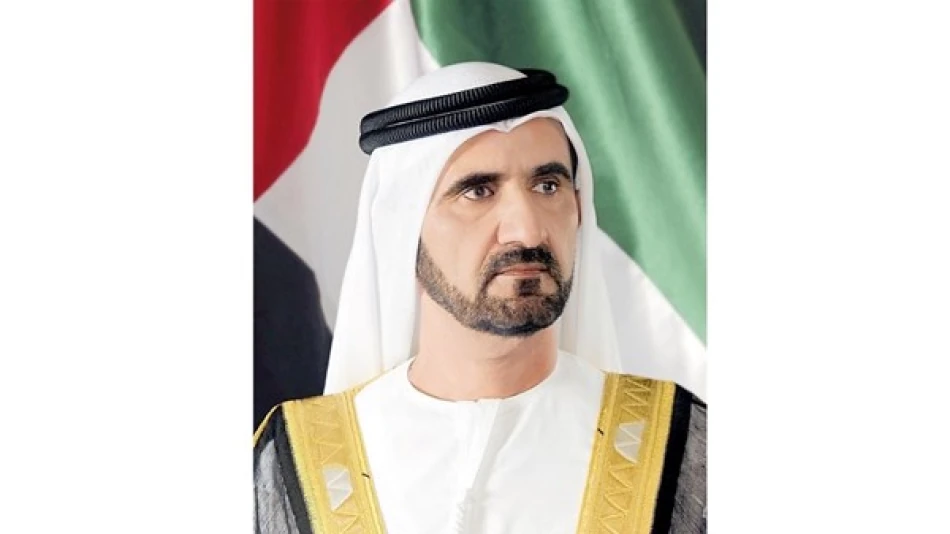
Emirati Leader Lauds Women: The Soul of the Nation, Companion on the Path
UAE Launches Vision for Next 50 Years of Women's Empowerment as Nation Celebrates Five Decades of Progress
The United Arab Emirates marked Emirati Women's Day with the unveiling of an ambitious new vision for women's advancement over the next half-century, as the nation celebrates 50 years of systematic female empowerment that has transformed it into a regional leader in gender equality and economic participation.
A Golden Jubilee of Women's Advancement
Sheikh Mohammed bin Rashid Al Maktoum, Vice President and Prime Minister of the UAE and Ruler of Dubai, emphasized the central role of women in the nation's development during the annual celebration. In a statement marking the occasion, he described women as "the soul of the nation, a homeland for the soul, and companions on the journey," underlining their multifaceted contributions as mothers, sisters, daughters, wives, and partners in national development.
The timing of this new vision coincides with a significant milestone: five decades since the UAE began its systematic approach to women's empowerment, a journey that began shortly after the nation's formation in 1971.
From Foundation to Global Leadership
Historical Context of UAE's Women's Empowerment
The UAE's approach to women's empowerment has been notably different from many regional peers. While neighboring countries have only recently begun significant reforms—such as Saudi Arabia's Vision 2030 allowing women to drive and attend sporting events—the UAE established its foundation for female participation in society much earlier.
This 50-year journey has yielded measurable results. Today, women constitute approximately 70% of UAE university graduates and hold significant positions across government and private sectors. The country ranks among the top globally for female participation in STEM fields and has achieved near-gender parity in higher education enrollment.
Regional and Global Comparisons
The UAE's sustained commitment to women's advancement places it ahead of many developed nations in specific metrics. Unlike the gradual, often politically contentious progress seen in some Western countries, the UAE's top-down approach has enabled rapid, comprehensive changes across multiple sectors simultaneously.
Singapore's similar model of government-led social development offers a parallel, though the UAE's integration of women into traditionally male-dominated sectors like space exploration, nuclear energy, and diplomatic leadership has been particularly striking.
Economic and Strategic Implications
Investment in Human Capital
The new 50-year vision represents more than social policy—it's an economic strategy. With global competition for talent intensifying and the UAE positioning itself as a hub for emerging technologies, maximizing women's economic participation becomes crucial for maintaining competitive advantage.
Research consistently shows that countries with higher female workforce participation experience stronger GDP growth. The UAE's early recognition of this principle has contributed to its transformation from a primarily oil-dependent economy to a diversified, knowledge-based one.
Government and Private Sector Response
The announcement signals continued government commitment to policies supporting women's advancement, likely including expanded childcare support, flexible work arrangements, and leadership development programs. For businesses operating in the UAE, this creates both opportunities and expectations for inclusive practices.
International companies view the UAE's progressive stance on women's rights as a competitive advantage when recruiting global talent and establishing regional headquarters.
Looking Forward: The Next Half-Century
While specific details of the new vision await announcement, the framework suggests continued focus on women as "agents of change" and "nurturers of generations." This dual emphasis on professional advancement and cultural values reflects the UAE's approach to modernization—embracing progress while maintaining cultural identity.
The success of this next phase will likely depend on addressing emerging challenges such as work-life balance in an increasingly digital economy, ensuring equal representation in emerging industries like artificial intelligence and renewable energy, and maintaining momentum as the country's leadership transitions to younger generations.
The UAE's model demonstrates that systematic, sustained investment in women's empowerment can yield significant economic and social returns, offering lessons for other nations seeking to maximize their human capital potential.
Most Viewed News

 Layla Al Mansoori
Layla Al Mansoori






